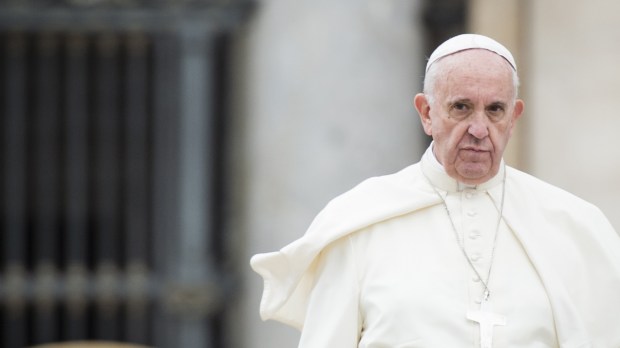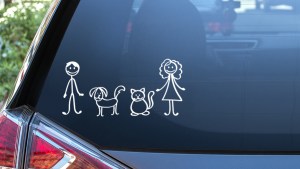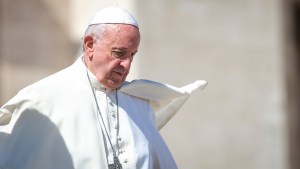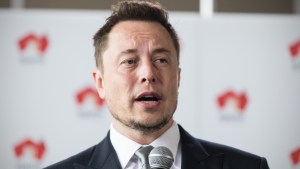Pope Francis’ recent comments on pets and children have caused quite a stir. Some have found it ironic that the celibate pope named after the patron saint of pets (Francis of Assisi) should take such a hard line on the subject. If you missed it, the Pope recently lamented, “Many, many couples do not have children because they do not want to, or they have just one – but they have two dogs, two cats… Yes, dogs and cats take the place of children. Yes, it’s funny, I understand, but it is the reality.” For some these were welcome words, but for others, the comments seem out of touch, even hypocritical.
So how do we make sense of what Pope Francis said? Is the Pope mocking pet owners? Is he insisting every couple have children?
1Not the first time
Pope Francis has spoken about pets and children several times during his pontificate. In fact, in 2014, the internet saw almost the exact same controversy we’re seeing now. On June 2, Pope Francis preached a homily in the chapel at the Vatican guesthouse where he lives, saying,
This culture of well-being from 10 years ago convinced us: It’s better not to have children! It’s better! You can go explore the world, go on holiday, you can have a villa in the countryside, you can be care-free … it might be better — more comfortable — to have a dog, two cats, and the love goes to the two cats and the dog. Is this true or is this not? Have you seen it? Then, in the end this marriage comes to old age in solitude, with the bitterness of loneliness. It is not fruitful, it does not do what Jesus does with his Church: He makes His church fruitful.
The Pope’s remarks made it to The Washington Post, Time Magazine, and a host of other major news outlets.
2Individualism and sacrifice
Despite the Pope’s celibacy, a fact not lost on commentators, Pope Francis has repeatedly highlighted the sacrifice required of couples to have children. In fact, in a recent letter to married couples, Pope Francis frankly concedes, “To be sure, raising children is no easy task.”
The enemy of self-sacrifice is individualism. Pope Francis has diagnosed this vice of our age saying, “Men and women of our postmodern world run the risk of rampant individualism, and many problems of society are connected with today’s self-centered culture of instant gratification. We see this in the crisis of family and social ties and the difficulties of recognizing the other.”
For Pope Francis, individualism diminishes our humanity. To be human means to live among others, loving and giving. As Pope Francis says, “It is a risk, yes: having a child is always a risk, either naturally or by adoption. But it is riskier not to have them.” To avoid motherhood or fatherhood for superficial reasons, for the Pope, is individualist and self-seeking.
3Materialism and consumerism
Closely linked to this vice of individualism, Pope Francis has repeatedly decried the materialism and consumerism of the modern world. During a recent trip to Greece, Pope Francis invoked Homer’s Odyssey to denounce the prevailing spirit of consumerism. The Pope told a group of young people, “Today’s sirens want to charm you with seductive and insistent messages that focus on easy gains, the false needs of consumerism, the cult of physical wellness, of entertainment at all costs,” he said. “All these are like fireworks: they flare up for a moment, but then turn to smoke in the air.”
Materialism plays into humanity’s desire for comfort. But as Pope Francis insists, “When we are healthy and comfortable, we forget about others (something God the Father never does): we are unconcerned with their problems, their sufferings and the injustices they endure… Our heart grows cold.” For Pope Francis, to embrace motherhood or fatherhood is to warm the heart, to think of others and their needs.
4Sustainability and population growth
Some environmentalists insist that the world’s birth rates ought to decline, for the sake of global sustainability. However, Pope Francis writes in Laudato Si, “Instead of resolving the problems of the poor and thinking of how the world can be different, some can only propose a reduction in the birth rate. At times, developing countries face forms of international pressure which make economic assistance contingent on certain policies of ‘reproductive health.’”
The Pope quipped in his remarks about Italy’s ensuing demographic winter, “Our homeland suffers, as it does not have children, and, as it has been said somewhat humorously, ‘and now who will pay the taxes for my pension, if there are no children?’ — with laughter, but it is the truth. Who will take care of me?” Pope Francis has repeatedly noted the dangers of Italy’s (and Western Europe’s) low fertility rates.
5Welcoming life
For Pope Francis, every child is a gift from God. He writes in Amoris Laetitia, “The gift of a new child, entrusted by the Lord to a father and a mother, begins with acceptance, continues with lifelong protection and has as its final goal the joy of eternal life. By serenely contemplating the ultimate fulfillment of each human person, parents will be even more aware of the precious gift entrusted to them.” For some, the hard truth is that for Pope Francis human beings have a significance and value that animals do not. In this sense, pets are not equal to children.
However, the Pope acknowledges that not every couple is able to have children, or even to have a large family. He says, “Saint John Paul II rightly explained that responsible parenthood does not mean ‘unlimited procreation or lack of awareness of what is involved in rearing children.’”




